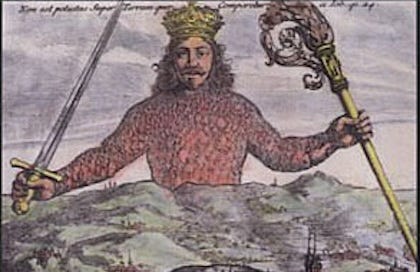Last week I promised to get into John Gray’s New Leviathans book, along with Wainwright and Mann’s Climate Leviathan. Why?
Well, because I’m trying to figure out how to be human in the Anthropocene, what could be a workable anthropology or “theory of the human” including an ethics, and a politics, since we’re inevitably involved in a collective endeavor.
There’s so much talk today about post capitalism (for example the degrowth movement or the Green New Deal) as a result of finding ourselves into the Anthropocene and climate change; as well as post liberalism as a reactionary measure (for example the widespread return of populism and a New Right). What that means is getting “post” and past valuing freedom and inequality in a democratic rule-of-law based political order, i.e. what’s usually called democratic classical liberalism.
I’m not sure the implications of this are fully appreciated.
So here we are, finding ourselves in a new age with profound planetary, human, and ecological impacts happening daily, all largely brought about by human progress (yes, we need to call it that), which has allowed the world population (of humans) to climb beyond 8 billion, world GDP to top $105 trillion, and proverbial billions (of humans) to be raised out of poverty. It has come at a tremendous cost, but this is huge progress. Arguably humans — who are now in control of the planet’s fate, by definition — aren’t going to pay attention or care about anything else if their basic livelihood and security is at stake.
In other words, we can’t get away from the basic political and economic issues that define the modern era.
And yet, with all the recent post talk, things are changing dramatically, and quickly. America’s world hegemony, which has tried since WW2 — and has been more or less successful, especially since 1989 and the fall of the Berlin wall — to bring freedom and prosperity to the world, is now in no way assured going into the future. There’s plenty of chaos at home, and increasingly abroad.
Just as the 20th century delivered profound political crises with the rise of totalitarian states in Europe (Nazism in Germany, Stalinism in Russia), along with ongoing political transitions Asia and South America, by no means complete, we are now facing New Leviathans coming onto the scene. New nationalist political movements with global ambitions are afoot in Russia and China, and elite world-governmental powers are increasingly being called into play by growing global concern — panic — over the state of climate, biodiversity, degradation of lands and waters, and so on: Climate Leviathan.
We need to think carefully about all this. Urgently, but also slowly, carefully.
My working hypothesis is that ancient or classical and “classic” wisdoms can and should still speak, even under present conditions of radical change and novelty. At the very least, we should keep track of where we’ve come from.
Toward engaging these two books fruitfully, against the wider backdrop of age-old political and economic debates, I’ve been trying to get back into the original Leviathan, that great founding book of modern political philosophy, written by Thomas Hobbes and published in 1651.
In case you need a refresher (I did), here’s a nice introduction.



